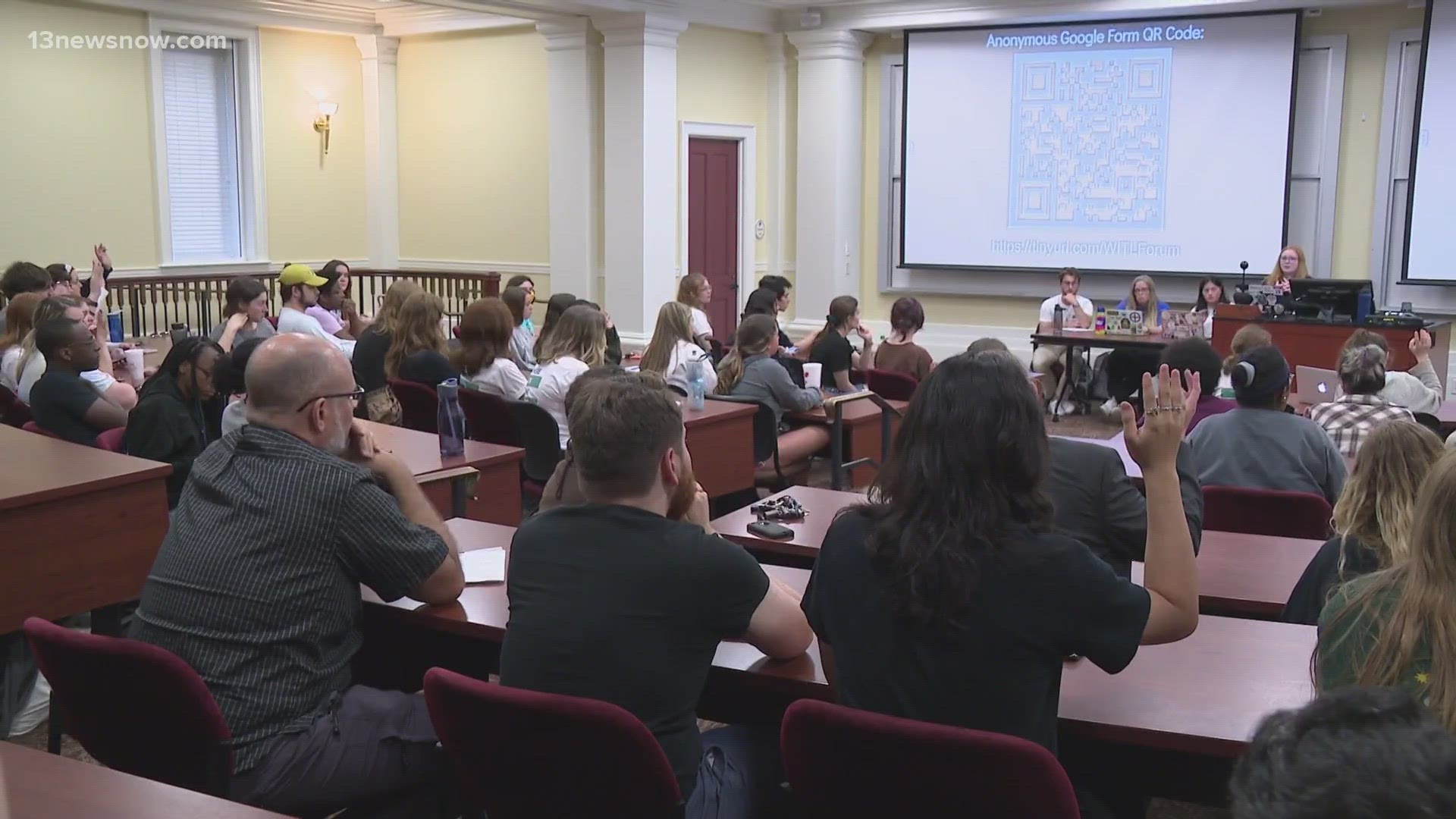NEWPORT NEWS, Va. — Students and faculty at Christopher Newport University came together Monday night to address sexual assault on campus.
They held a forum to talk about how the school can better help victims.
It comes as one woman shares her experience with the reporting process.
Brooke Nixon, who graduated from CNU last year, said she was drugged and sexually assaulted during her senior year.
The Title IX office launched an investigation and, ultimately, her attacker was expelled.
While Nixon said she was relieved with the outcome of her case, the process took an emotional toll on her.
"You know - I spent my final months, all my graduating moments, and the ending parts of my time here secretly fighting this case while trying to soak in my last moments as a student," Nixon said. "We love CNU, it's our alma mater and we just want to make sure there's change for the future and future students."
There is a petition circulating among students and staff asking for five key changes:
- "Clarification on Policy 9055, and how CNU will handle cases involving perpetrators that are seniors.
- A revamping of how sensitive case files are sent in a way that ensures FERPA and case protections are met, that is shared with the University community.
- An upholding of the parameters put in place by university-governed no-contact orders.
- Increased oversight and accountability for the Title IX office staff, including the identification of reasonable ways students can express any concerns to parties independent of the office.
- A public acknowledgment of their stories, Christopher Newport’s role in them, and the changes that administration will put in place to address them, including a critical look at the current staff in the Title IX office and their role in our cases."
Monday night's forum, hosted by the student group Where is the Line, was an extension of that, where victims spoke out about being wronged by the people who are supposed to hold perpetrators accountable.
More than 100 people packed a lecture hall Monday night, leaving standing room only, all to start a dialogue on the Title IX investigation process and how college administrators everywhere can better communicate and help sexual assault survivors.
"I am very disgusted with how Title IX has acted," one CNU sophomore said.
She stood before the room to share her experience of someone sexually assaulting her.
She said she spent months trying to get a no-contact order or even an assurance the perpetrator would not be in the same residence hall as her, but got neither from the office.
"I have been terrified for the last two years of my life of this man and they cannot promise anything to me," she said.
Another student shared a similar story.
"Last semester, I was pretty severely sexually assaulted off campus," the student told the crowd.
She said she asked the Title IX office for a no-contact order and mandatory therapy for the person who assaulted her.
"They closed my case without my knowledge because they met with him and they believed him when he said he was sorry and that they believed he was sincere in his apologies. So, they closed my case and I didn’t get any justice," she said.
Another student shared her story of being physically and emotionally bullied, discriminated against and harassed. She said she provided proof to the Title IX administrators, but nothing was done.
Story after story was shared, but common themes ran through them: they didn’t feel heard or believed. So, they want to see change.
Some solutions offered were to have a victim advocate within the Title IX office and placing those being investigated on a week’s suspension while the investigation moves forward.
Others voiced concerns about faculty and staff being forced to report incidents, saying it deters people from coming forward and put them in an uncomfortable situation.
Some in the room also raised a concern that there is a misunderstanding of what Title IX does. It acts as an investigative body, but many use it as a victim resource center.
In a statement, a spokesperson for CNU said, "Title IX requires us to have a fair, impartial and exhaustive process that respects the rights of all parties."
Emily Sullivan, a CNU alumni and sexual assault survivor, compared her experience with the Title IX office as being assaulted all over again and encourages people to speak out and demand change.
"I am a survivor of sexual assault and I am a victim of the Title IX office. My assaulter raped my body, but Title IX raped my soul."
On-campus sexual assault is not just a CNU problem, it happens all over the country.
In fact, about 1 in 4 female undergraduate students are sexually assaulted across the country. Only about 20% of them report, according to data from the Rape, Abuse & Incest National Network (RAINN).
CNU Interim President Adelia Thompson said in an email to students that she welcomed the forum hosted by the student group.
She said in part, "I am asking the leadership of ‘Where is the Line’ to share with me what they learn through tonight’s discussion and then together we will share those insights with other members of the University’s administrative team."

